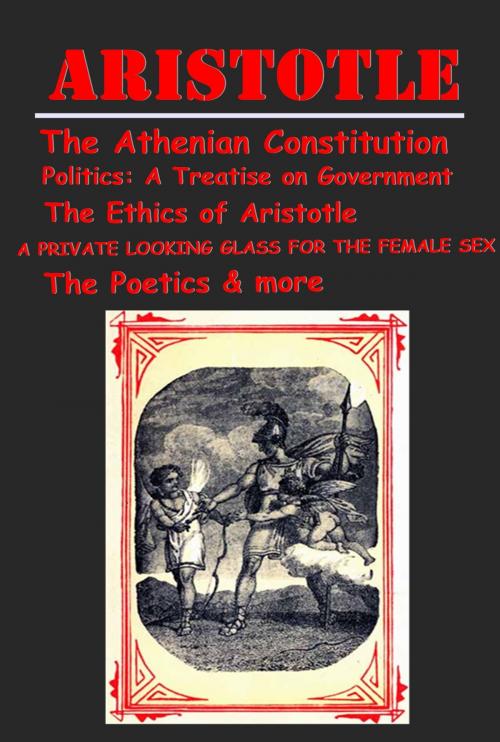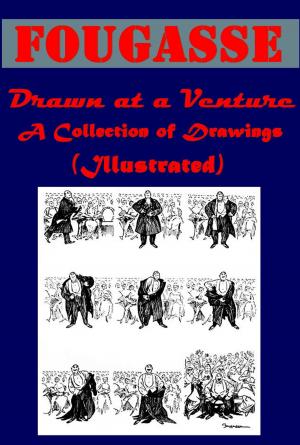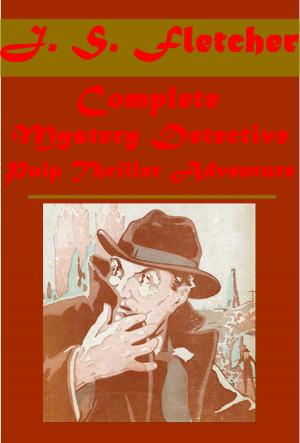Complete Health, Politics Poetics & Ethics Anthologies of Aristotle (12 in 1) (Illustrated)
Nonfiction, Health & Well Being, Psychology, Physiological Psychology, Health, Health Care Issues, Applied Psychology| Author: | Aristotle | ISBN: | 1230000210394 |
| Publisher: | AGEB Publishing | Publication: | January 16, 2014 |
| Imprint: | Language: | English |
| Author: | Aristotle |
| ISBN: | 1230000210394 |
| Publisher: | AGEB Publishing |
| Publication: | January 16, 2014 |
| Imprint: | |
| Language: | English |
Containing his Complete Masterpiece and Family Physician; his Experienced Midwife, his Book of Problems and his Remarks on Physiognomy
Contents
The Athenian Constitution
The Categories
The Works of Aristotle the Famous Philosopher
THE MIDWIFE'S VADE-MECUM
A PRIVATE LOOKING GLASS FOR THE FEMALE SEX
THE FAMILY PHYSICIAN
THE EXPERIENCED MIDWIFE
PROPER AND SAFE REMEDIES
ARISTOTLE'S BOOK OF PROBLEMS
THE SECRETS OF NATURE RELATING TO PHYSIOGNOMY
The Poetics
The Ethics of Aristotle
Politics: A Treatise on Government
Ethics -
The Ethics of Aristotle is one half of a single treatise of which his Politics is the other half. Both deal with one and the same subject. This subject is what Aristotle calls in one place the "philosophy of human affairs;" but more frequently Political or Social Science. In the two works taken together we have their author's whole theory of human conduct or practical activity, that is, of all human activity which is not directed merely to knowledge or truth.
The Poetics -
In the tenth book of the Republic, when Plato has completed his final burning denunciation of Poetry, the false Siren, the imitator of things which themselves are shadows, the ally of all that is low and weak in the soul against that which is high and strong, who makes us feed the things we ought to starve and serve the things we ought to rule, he ends with a touch of compunction: 'We will give her champions, not poets themselves but poet-lovers, an opportunity to make her defence in plain prose and show that she is not only sweet--as we well know--but also helpful to society and the life of man, and we will listen in a kindly spirit. For we shall be gainers, I take it, if this can be proved.' Aristotle certainly knew the passage, and it looks as if his treatise on poetry was an answer to Plato's challenge.
Politics: A Treatise on Government -
The Politics of Aristotle is the second part of a treatise of which the Ethics is the first part. It looks back to the Ethics as the Ethics looks forward to the Politics. For Aristotle did not separate, as we are inclined to do, the spheres of the statesman and the moralist. (Translated by William Ellis.)
Containing his Complete Masterpiece and Family Physician; his Experienced Midwife, his Book of Problems and his Remarks on Physiognomy
Contents
The Athenian Constitution
The Categories
The Works of Aristotle the Famous Philosopher
THE MIDWIFE'S VADE-MECUM
A PRIVATE LOOKING GLASS FOR THE FEMALE SEX
THE FAMILY PHYSICIAN
THE EXPERIENCED MIDWIFE
PROPER AND SAFE REMEDIES
ARISTOTLE'S BOOK OF PROBLEMS
THE SECRETS OF NATURE RELATING TO PHYSIOGNOMY
The Poetics
The Ethics of Aristotle
Politics: A Treatise on Government
Ethics -
The Ethics of Aristotle is one half of a single treatise of which his Politics is the other half. Both deal with one and the same subject. This subject is what Aristotle calls in one place the "philosophy of human affairs;" but more frequently Political or Social Science. In the two works taken together we have their author's whole theory of human conduct or practical activity, that is, of all human activity which is not directed merely to knowledge or truth.
The Poetics -
In the tenth book of the Republic, when Plato has completed his final burning denunciation of Poetry, the false Siren, the imitator of things which themselves are shadows, the ally of all that is low and weak in the soul against that which is high and strong, who makes us feed the things we ought to starve and serve the things we ought to rule, he ends with a touch of compunction: 'We will give her champions, not poets themselves but poet-lovers, an opportunity to make her defence in plain prose and show that she is not only sweet--as we well know--but also helpful to society and the life of man, and we will listen in a kindly spirit. For we shall be gainers, I take it, if this can be proved.' Aristotle certainly knew the passage, and it looks as if his treatise on poetry was an answer to Plato's challenge.
Politics: A Treatise on Government -
The Politics of Aristotle is the second part of a treatise of which the Ethics is the first part. It looks back to the Ethics as the Ethics looks forward to the Politics. For Aristotle did not separate, as we are inclined to do, the spheres of the statesman and the moralist. (Translated by William Ellis.)















